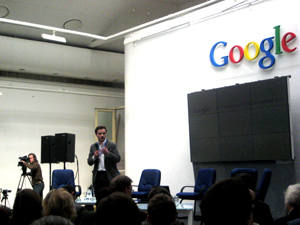21 Thesis Education 2.0
 Education 2.0: theses of the conference-exhibition of achievements of google economy
Education 2.0: theses of the conference-exhibition of achievements of google economyMarch 27, Moscow. Google has hosted an expert roundtable and conference for educators and education professionals under the umbrella of Education 2.0.
The conference began with an open discussion, which was attended by Dmitry Zimin (Dynasty Foundation), Olga Polyakova (Gymnasium 1518), Anna Zelentsova (International Forum of Business Leaders), Ilya Schurov (Computerra), Svetlana Konyushenko, (Russian State University named after I. Kant, Kaliningrad) and Dmitry Peskov (MGIMO). In addition, experts and representatives of the educational community of Russia actively participated in the debate.
1. In the era of the Internet, there is no one who is smarter than everyone. The era of computers is over. Today, not computers work, but communications. A network economy and network education have emerged.
2. The modern problem of education: education of human culture, education of worldview. Nowadays, access to knowledge (via the Internet) has depreciated, but this does not help education. The education of the worldview suffers. The existing flow of information is "littered" and a person should be able to filter it and this should be taught by the teacher!
3. The availability of information on the Internet is good - but like any freebie, it dilutes the brain. Perhaps the Internet is killing interest in learning? The volume of information has increased hundreds of times. There is an opportunity to watch all the chess games over the past hundred years, but this does not increase the number of grandmasters.
4. In the era of the Internet, you must be a teacher of a new type. Possess new competencies. The teacher must be able to learn himself, he must be able to transfer his language to the Internet. Critical thinking is the first thing that should be when you enter the network. However, it must also have universal characteristics regardless of time. Now we can not predict the future.
5. Education as a process: “training-upbringing-development” and nothing in it can replace live communication between teachers and students. In learning, different channels of perception may dominate in each person. For the learning process to be effective, all channels must be involved. Trainees take an example from a teacher and the Internet does not replace it.
6. Teachers who know information technology at the user level come to schools, there is no visible barrier between teachers and students in the possession of new technologies, but for teachers it is now a big problem to put all the necessary knowledge into the lesson with maximum efficiency. This is due to the acute demand for new educational technologies.
7. Information technologies solve many problems in the field of education, but they do not solve the problem of filling educational resources with quality content.
8. A lot of books on pedagogy and education are sold in bookstores, but there are no links to useful Internet resources. There is a lot of useful material for the teacher on the Internet, but he does not have the opportunity to search for it for many hours.
9. Education in Russia is in crisis. A lot is said about those things that simply do not exist. The training of schoolchildren, university entrants, students, and teachers is often simply not ready to work with children. An erroneous orientation is set on the transfer of knowledge, and not on learning activities. We have many computers, communications are actively developing, but we are still people of the 20th century, and in pedagogy we are people of the 19th century.
10. We talk a lot about modern equipment, new technologies, but often we have forgotten about the people who should use this equipment and use it in their practical activities.
11. The main goal in education is the development of the intellectual in any profession. Classical pedagogy is "childbearing." We are all educators, someone is doing it professionally, and someone is just at home with their children.
12. Content filtering in educational institutions does not solve the problem. Anyone who wants in any case will find the opportunity to see negative content. Filtering is necessary for the whole society as a whole.
13. The flow of information is growing and it is becoming a new factor in production. What is the place of the teacher and student in these flows?
14. Modern technology builds organizational forms of communication in a different way. Not vertical, but horizontal ties line up. In these ties - the stronger the authority of the teacher as a person - the stronger this will attract students. Students' self-esteem increases when the teacher tells them: "let's do it together." On Wikipedia, both a loser and a professor can edit an article - and this scheme works successfully. On the network, everyone is on the same board.
15. Students come to the Internet because there is a “fast life."
16. In the era of education 2.0, ordinary universities should become “student corporations.” Communities of a new type should be created inside them.
17. Modern requirements of employers for graduates: the ability to analyze information, project thinking, teamwork. These are the needs of the new economy, but the existing education system does not support real processes in the economy. In addition, she does not teach how to adapt to life.
18. Web 2.0 is knocking on education, but they are not opening it.
19. The most important thing is not the volume of knowledge, but the speed of change.
20. Developers of modern educational technologies offer teachers beautiful toys, but the teachers themselves are not involved in their development and, as a result, these toys do not take root in the educational process.
21. The family left the education process. Children go online, experiencing a lack of communication in the family.
R.A. Dorofeev, faito.ru
